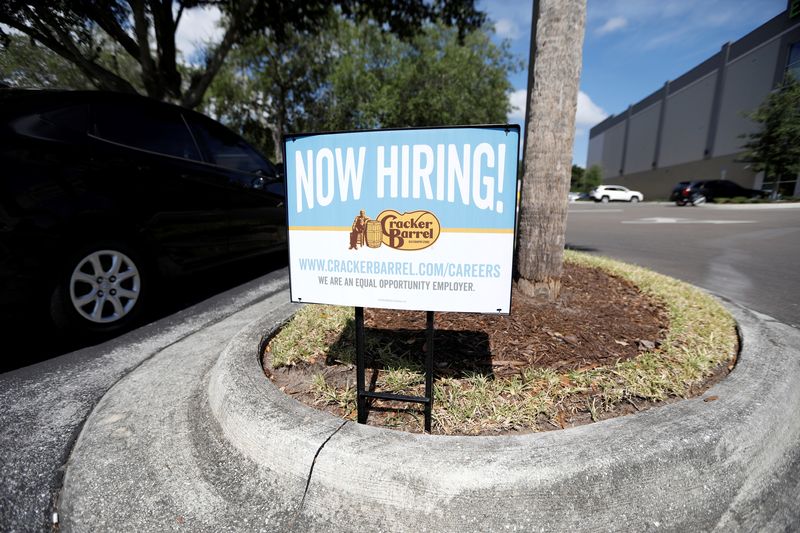A look at the day ahead in U.S. and global markets from Mike Dolan
With even the Federal Reserve meeting in the shade of Tuesday's election, markets have little to go other than last-minute opinion polls that tilt the tight White House race either way, and Iowa did just that over the weekend.
With Tokyo markets closed on Monday and trading thinner as a result, the dollar recoiled sharply from Friday's close after a Des Moines Register/Mediacom Iowa Poll on Saturday put Democrat Kamala Harris three points clear of Republican Donald Trump in a state that Trump easily won in 2016 and 2020.
The dollar index is on course for its biggest one-day drop in more than two months.
Ten-year U.S. Treasury yields fell back six basis points from Friday's close too, with related 'Trump trades' seeing Bitcoin fall back too while China's yuan and Mexico's peso firmed.
Although most elections are riven with some rogue polls and bum steers, and the lead was within margins of error, it showed a sharp reversal of a September poll showing a 4 point lead for Trump. What's more, Iowa is seen by pollsters as having a decent track record of getting the eventual result correct historically - even though it only packs six electoral college votes.
With bookmakers also lengthening odds of Republican clean sweep of Congress, the Iowa poll suggests at least that early bets on the outcome - where financial markets had been leaning toward a Trump victory in recent weeks - may prove premature.
The election stakes for the U.S. economy, world trade and geopolitics don't need re-stating at this point and markets around the globe will have at least a nervy 48 hours ahead. And with the outcome so tight in so many key swing states, there's considerable doubt about when exactly the election result will eventually be called.
All of which potentially puts Thursday's Fed decision in the context of an election result that may not yet be known - especially the outcome in Congress that will largely dictate the fiscal policy backdrop for the Fed. And gridlock at this point seems to be seen as the most likely outcome.
Futures markets seem unperturbed by the politicking and stick firmly to expectations of a quarter-point rate cut on Thursday, and another 100bps of easing in the 12 months after.
But, not unlike the Iowa poll, the Fed was thrown something of a curve ball by the October employment report on Friday. Hampered by storms and strikes, U.S. payrolls rose far less than forecast - adding just 12,000 jobs last month in the smallest gain since 2020, more than 100,000 less than expected and with prior months revised down.
Hurricane Helene devastated the U.S. Southeast in late September and Hurricane Milton lashed Florida a week later.
As indication of some of the distortions involved, the response rate for the establishment survey in October, from which payrolls are calculated, dropped to 47.4%. That was the lowest reading since January 1991 and was considerably below the 69.2% average for October in the past five years.
After an initial swoon in Treasury yields, borrowing rates quickly backed up as traders mulled a potential bounceback this month and resumed their focus on the election. Only the weekend Iowa poll has reined them in again first thing today.
While the Atlanta Fed's closely-watched "GDPNow" model has estimated economic growth ebbing to 2.3% from 3.4% over the past week, the 10-year Treasury 'term premium' capturing investor risk compensation longer term remains at its highest in a year as are key gauges of Treasury volatility.
An additional irritant to sovereign bond yields has been the backup in the oil price over the past week, with U.S. crude regaining $70 per barrel for the first time in 10 days.
Oil prices rose more than 2% on Monday on a decision by OPEC+ producers to delay by a month plans to increase output. On Sunday, OPEC+, which includes the Organization of the Petroleum Exporting Countries plus Russia and other allies, said it would extend its output cut of 2.2 million barrels per day, with an increase already delayed from October because of falling prices and weak demand.
The grouping had been due to increase output by 180,000 bpd from December.
Elsewhere, the focus was on China, where a key leadership meeting happens around the U.S. election and the outcome may hinge on the U.S. election result.
The Standing Committee of the National People's Congress meets from Monday to Friday and is expected to approve additional stimulus to boost the slowing economy - and early indications of the size of the stimulus may be increased if Trump wins and huge tariff raising plans against Chinese imports then loom.
Chinese mainland and Hong Kong stocks were higher on Monday ahead of the meeting.
European stocks were also higher first thing, with British benchmarks also up.
UK markets recovered ground after last week's big 'tax, borrow and invest' budget from the new Labour government. The Bank of England meets on Thursday alongside the Fed and is also expected to cut UK interest rates by a quarter point - in what would be its second cut of the cycle.
Key developments that should provide more direction to U.S. markets later on Monday:
* US September factory goods orders, October employment trends
* US corporate earnings: Fox, Marriott, Loews (NYSE:L), AIG (NYSE:AIG), Wynn Resorts (NASDAQ:WYNN), Constellation Energy, Franklin Resources (NYSE:BEN), Eversource, NXP (NASDAQ:NXPI), Palantir (NYSE:PLTR), Diamondback (NASDAQ:FANG), Vertex (NASDAQ:VRTX), Celanese (NYSE:CE), Zoetis (NYSE:ZTS), Realty Income (NYSE:O), Revvity, Public Service Enterprise (NYSE:PEG), Hologic (NASDAQ:HOLX) etc

* US Treasury auctions $58 billion of 3-year notes, as well as 2- and 6-month bills
* Euro group finance ministers meet in Brussels
(By Mike Dolan,; mike.dolan@thomsonreuters.com)